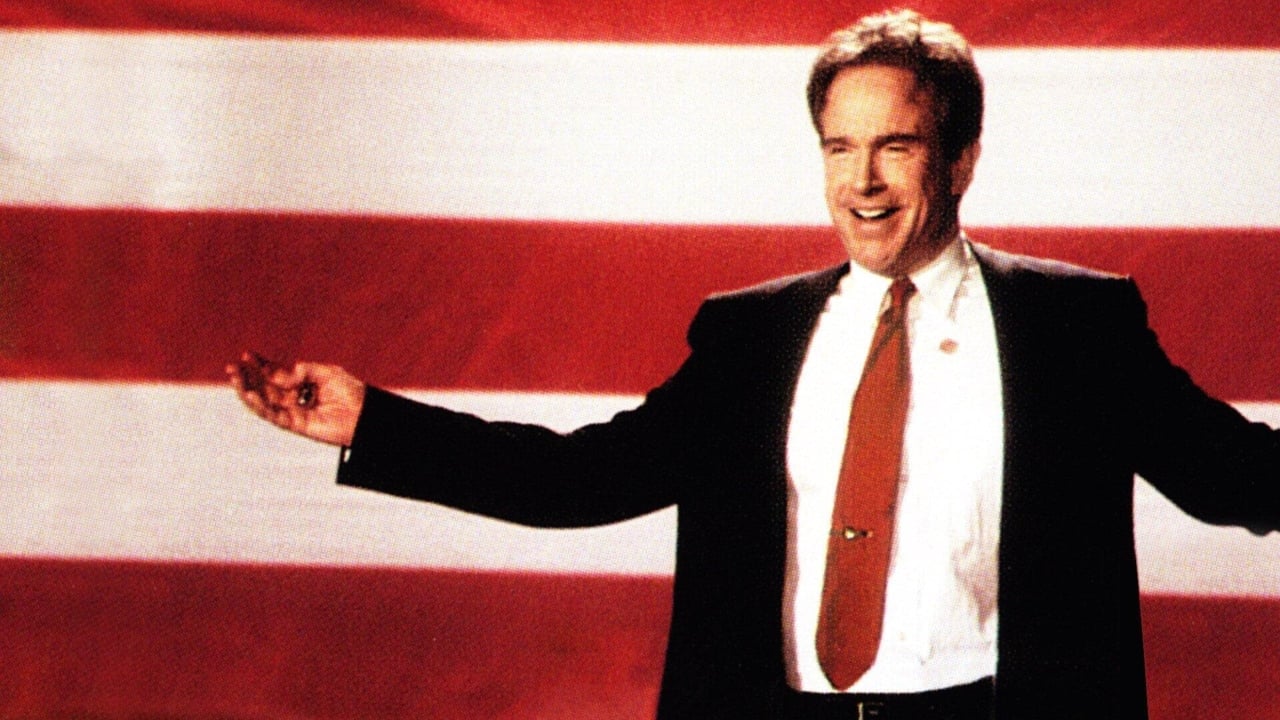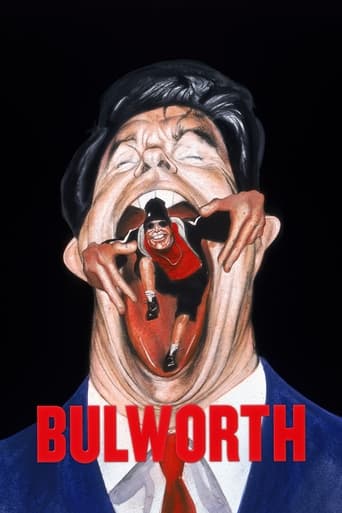

20 years after it was released, IMHO it's better than the average rating of around 7 given so far, and has withstood the test of time as a comedic political statement. You can get everything else in 230 prior reviews.
... View MoreI rate 'Bulworth' an A for degree of difficulty and ambition, C- for execution. Reading through the reviews here, this is clearly a polarizing film. I believe this is ultimately the legacy of the film, which is to say 'Bulworth' will never be remembered as a truly great film.Where this film falls short of its mark is in the limousine liberal rhetoric Senator Bulworth spouts, or raps embarrassingly. After the first few rhymes, which were sort of cute, it becomes cringeworthy. His rap is the worst I've ever heard, its so bad some might see it as mockery of legitimate hip-hop. We get the same political ideology of the liberal elites of the Democrat Party. Its like a broken record, its sounded good or decades, but when these Democrats get into positions of power in government, nothing changes. I would expect conservatives to dislike this, but I'd many progressives are do as well.I do give credit to Beatty for a courageous effort, but the film falls short of its high ambitions. The legacy of 'Bulworth' is really the legacy of the 1960s liberal/radical generation, a lot of talk and theater, no meaningful action or change. The socio-economic standing of poor, inner city African Americans has hardly changed in 50 years.
... View MoreMy friend didn't really like this movie all that much claiming that he couldn't really relate to the African-American subculture, but what I really think is that this movie is directed to minority people in general and is quite anti-corporate.The movie is focused around incumbent senator for California, Senator Bullsworth. The movie opens with him watching his campaign trailers and crying. It seems that the weight of his position has finally fallen on him. We learn that his wife really doesn't love him anymore and he has asked a hit-man to kill him. Suddenly he turns on the political system and begins to drag it through the mud. The first speech is at a Negro church and when he is asked questions, instead of giving a sugar coated non-committal answer, he tells them the truth. They have no money and thus do not matter. Soon he turns on the corporate sponsors, criticising their manipulation of the political system by throwing lots of money in the right direction.Thus senator Bullsworth throws away his lifestyle and delves into the Negro community. He attacks the corporations that run the nation and supports the under powered minorities. He even turns his teeth on the drug pushers, seeing them as evil pawns of the faceless corporations.Basically this movie is Bullsworth's epiphany. He wants to die at first, and with this he has his epiphany - the realisation before his death. Throughout the movie we know that he is going to die, because even though he is popular, he cannot get away with making the statements that he is making. He is being incredibly controversial, and such a stance can never last that long. It rocks the boat way too much and as such can't be allowed to succeed. In the America of the movies things cannot change too much, and in fact, if it has happened before hand, things will be set straight. I guess this then shows the tragedy of society, that when a saviour arrives, he will be killed, because those in power don't want to give it up.
... View MoreScreenplay: Conceived by Beatty himself, Bulworth was committed to paper by an extraordinarily versatile trio: co-writer of one of Beatty's earlier forays Jeremy Pikser, James Toback, the adaptor of Bugsy, and Aaron Sorkin, whose renowned machine-gun fire dialogue is no stranger to politics (see The West Wing). The result is, unsurprisingly, imbalanced. The plot follows Democratic Senator Jay Bullington Bulworth, a man who has become so jaded by the American political system that he has taken a contract out on his own life, after "purchasing" $10 million worth of life insurance. This all takes place leading up to his campaign for re- election and so, with a new reckless, go for all outlook on life, he starts speaking the truth. As a rap. Yes, a rap. Warren. Beatty. Rapping. Politics. Rap. Ping. Strangely, and really bloody unexpectedly, it works! Most of the time... Kind of. I mean, how well would you expect something like that to work? In a sophisticated satire? The context is sort of there: he begins rapping to appeal to the disparaged and African-American community, where most of the focus is directed during this film. Most of what is said by Bulworth pokes holes in the financial support that insurance companies offer to candidates on both sides of the water, usually so as to enlist a vote against bills that force these companies in having to extend free health care or other such coverage to, yep, African-Americans. Not everything that he says sticks; actually, to be honest, I didn't even follow some of the logic he was spouting. But maybe I just don't have sufficient understanding of American politics. At any rate, the script is at it's best with moments of total uninhibitedness ("Everybody just got to keep f*cking each other till we're all the same colour.") and when it takes its time to make a point, as opposed to just dropping "the N word" incessantly.Actors: Beatty's not much of a rapper. Well, that's alright I suppose. I'm a white boy from Tasmania, so who am I to judge? What's important is that he makes us believe Bulworth's erratic and quixotic frame of mind, which he does most of the time. It helps that, when he can't, he's usually operating on one or more mind-altering substances. And his chemistry with the sexy and savvy Halle Berry is palpable, making their connection surprisingly touching on some level.Direction: Beatty has never made a bad film. He's been in a few, to be sure (Love Affair, Town & Country), but he has yet to direct a film of sub-par quality. Here, he applies a basic yet effective formula to filming Bulworth, immersing us in the unfamiliar settings that the eponymous character himself is amongst and juxtaposing us in a way that makes us empathise. We feel as out of place in these night clubs and ghetto back streets as Bulworth, but the stiltedness slowly subsides to suggest a gradual ease that he begins to feel. Nothing to get excited over, but well-executed with appropriate measure.Potential for repeat viewings: My second viewing, and I would happily watch it again... In a while. Some might be put off by the ending(s), but I like them; the first one seems a little phony and too neat until the true ending reveals itself, adding a dignified poignancy to the film. I feel I've not said enough about the humor in this film, and I should point out that it is very funny. Not the laugh out loud sort of funny that some prefer; the humor is not obvious, not brazen or expectant of hearty bellows. But it is quietly amusing, requiring only a wry grin or occasional chuckle to be fully appreciated. And, joy of all joys, most of the time it is very, very clever. Far cleverer than me, at any rate.
... View More